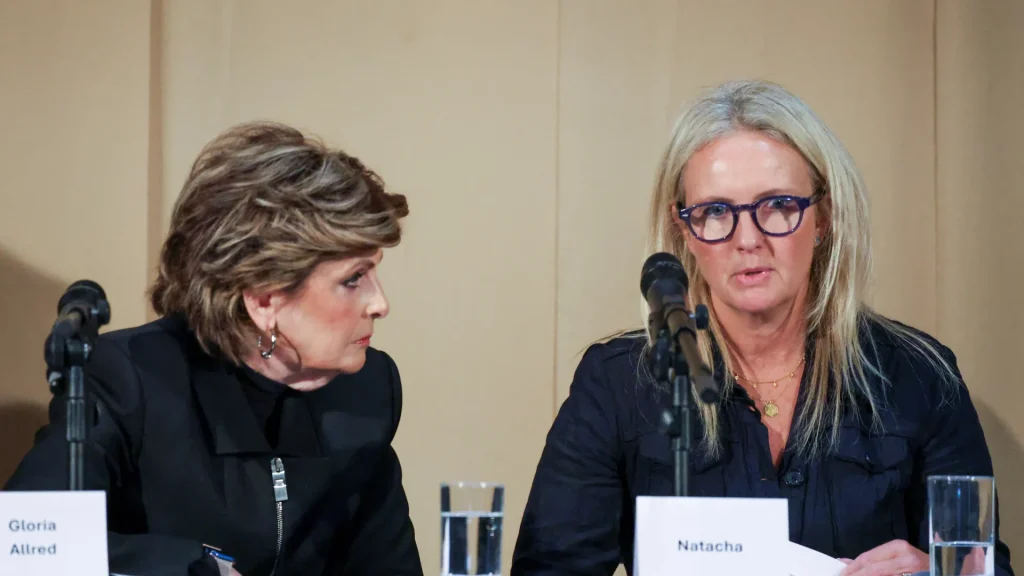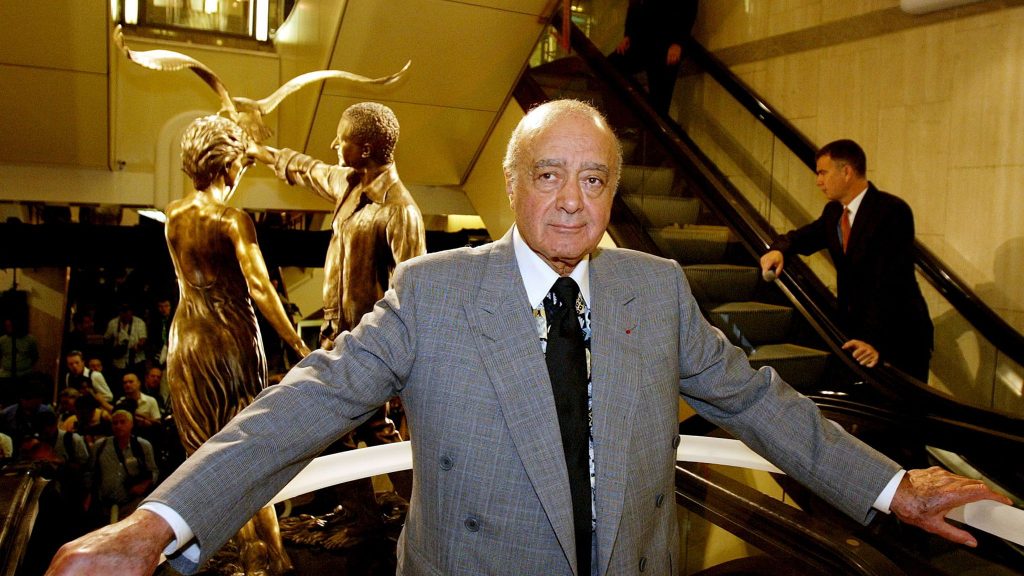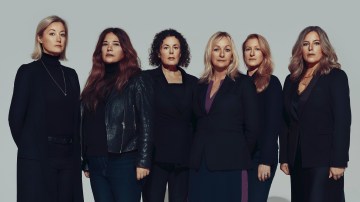Over 400 Women Allege Sexual Abuse by Late Billionaire Mohamed Al Fayed in Harrods Case.
More than 400 women have stepped forward, alleging sexual abuse and rape at the hands of the late Egyptian billionaire Mohamed Al Fayed. The legal team leading the case has reported a staggering number of accusations involving Al Fayed’s empire, particularly centered on the iconic London department store, Harrods. According to Dean Armstrong, a lawyer for the claimants, this growing number represents “an industrial scale abuse,” a dark chapter that has taken decades to fully emerge into public view.
The allegations against Al Fayed predominantly focus on Harrods, where many of the alleged incidents took place during his ownership. In September, a revealing BBC documentary outlined a disturbing pattern of alleged sexual misconduct, coercion, and control, claiming that Al Fayed forced female staff to undergo medical screenings, subjected them to threats, and manipulated their employment conditions as leverage. The documentary also alleged that staff at Harrods were discouraged from speaking out, creating a culture of silence and complicity within the luxury department store’s walls.
This latest development has sparked widespread calls for an investigation into whether there were systemic failures at Harrods during Al Fayed’s ownership, and how such widespread abuse allegations could have remained concealed for so long. Harrods has since issued an apology, stating that it is “appalled” by the accusations and has established a process for current and former employees to seek compensation. However, this measure has faced criticism, with victims and advocates questioning its effectiveness given that Harrods itself is seen as an environment where some of the abuse allegedly took place.

Bruce Drummond, another lawyer representing the victims, highlighted that the alleged abuse was not confined to Harrods alone. Drummond cited other locations connected to Al Fayed’s business interests, including Fulham Football Club, the prestigious Ritz Paris, and his estate in Surrey. The lawyer described the situation as “industrial scale abuse,” implicating not only Al Fayed but potentially those within his circles who may have enabled or ignored the alleged misconduct.
The geographic spread of the allegations underscores the vast influence Al Fayed wielded across multiple continents. While the majority of accusers are from Britain, victims have reportedly come forward from countries around the globe, including the United States, Australia, Malaysia, Spain, and South Africa. Among the victims are individuals from prominent backgrounds, including the daughter of a former U.S. ambassador and the daughter of a well-known soccer player. While specific names were not disclosed to protect the privacy of the claimants, Drummond’s revelations suggest a far-reaching impact.
Following the release of the BBC documentary, Harrods introduced a compensation scheme aimed at providing redress to individuals affected by the alleged misconduct. However, the scheme has faced significant backlash, with several women voicing concerns about its impartiality. Four victims have reportedly withdrawn from the Harrods-led compensation process, citing fears over potential conflicts of interest and dissatisfaction with the program’s communication practices.

Some victims and their representatives argue that seeking compensation directly from Harrods poses ethical concerns, given that it was the site of much of the alleged abuse. Drummond echoed these sentiments, noting that some senior members of staff from the Al Fayed era still work at Harrods, adding to the discomfort for those attempting to engage with the compensation scheme. Lawyers have called on Harrods to either overhaul the scheme to ensure transparency and independence or to hand over the process to an independent body that could provide victims with a sense of impartiality and justice.
In a particularly damning aspect of the BBC investigation, former employees alleged that the culture within Harrods during Al Fayed’s ownership actively discouraged speaking out against the billionaire. Accusations of cover-ups, manipulation, and institutional indifference have added to the controversy surrounding the department store’s handling of complaints. For years, various media outlets, including Vanity Fair in 1995, ITV in 1997, and Channel 4 in 2017, reported allegations of sexual abuse and exploitation by Al Fayed. Yet, the reports seemingly failed to incite sufficient public or legal action until after his death last year.
According to Armstrong, many victims only felt comfortable speaking openly after Al Fayed’s passing, with some stating they feared retribution or stigma while he was alive. “The scale of abuse perpetrated by Al Fayed and facilitated by those around him continues to grow,” Armstrong said, expressing hope that this moment represents a turning point for those impacted.
As the allegations continue to unfold, Harrods has expressed remorse for the alleged misconduct, apologizing to the victims and acknowledging the failings of past oversight. A Harrods spokesperson noted that the department store is committed to supporting current and former employees affected by the claims, stating, “We are appalled by these allegations and will do everything in our power to assist those impacted.” The company’s apology, however, may not be enough to satisfy those who feel a deeper, independent investigation is warranted to bring the entire truth to light.

Critics of Harrods’ response argue that the company must go beyond compensation efforts, calling for a comprehensive probe into its policies, practices, and historical compliance with labor and safety standards. A thorough inquiry, advocates argue, would ensure that any remaining harmful practices are identified and rectified to prevent future abuses. This could also pave the way for more robust legislation and regulatory measures that protect employees across industries from similar misconduct.
The Al Fayed scandal has become emblematic of a larger discussion around corporate responsibility, institutional accountability, and the power dynamics that allow such abuses to occur. With recent cases of workplace abuse and sexual misconduct coming to light across various sectors, public attention has increasingly turned toward holding organizations accountable for systemic abuse within their ranks.
Legal experts have pointed out that organizations must have checks and balances in place to prevent any one individual from wielding unchecked power over employees. Corporate governance experts also stress the importance of creating whistleblower protections, ensuring that employees have safe avenues to report misconduct without fear of retaliation. The Al Fayed case, they argue, underscores the urgent need for strong internal and external oversight mechanisms within organizations like Harrods and other high-profile institutions.
As the case against Al Fayed’s estate progresses, victims and advocates are hopeful that the publicity surrounding the allegations will lead to lasting changes. Armstrong and Drummond’s legal team have vowed to pursue justice for the hundreds of claimants, while urging lawmakers and corporate leaders to prioritize employee safety in all work environments.
The revelations have also sparked discussions about revisiting historical cases of abuse within other corporate and high-profile entities, which may have similarly suppressed or mishandled complaints. With each new case, there is a growing movement towards transparency and accountability, pushing companies to adopt proactive measures for the protection of their employees and to create safe, respectful workplaces.
The fallout from these allegations places Harrods squarely in the spotlight, as the world watches to see how the company will handle the claims and what changes may be implemented to prevent future abuses. For the victims, the coming months represent an opportunity for long-overdue acknowledgment, redress, and healing. While Harrods has taken steps to establish compensation, the effectiveness of this program remains to be seen.
Moving forward, public trust in Harrods and other organizations associated with Al Fayed may hinge on their ability to address these disturbing claims comprehensively. As legal proceedings unfold, the case serves as a reminder of the necessity for rigorous ethical standards and protections within the workplace, ensuring that the rights, dignity, and safety of all employees are safeguarded.
With over 400 allegations now on record, the Harrods scandal highlights the importance of creating supportive structures that empower victims to come forward and of holding those in power accountable, regardless of their influence or wealth.




